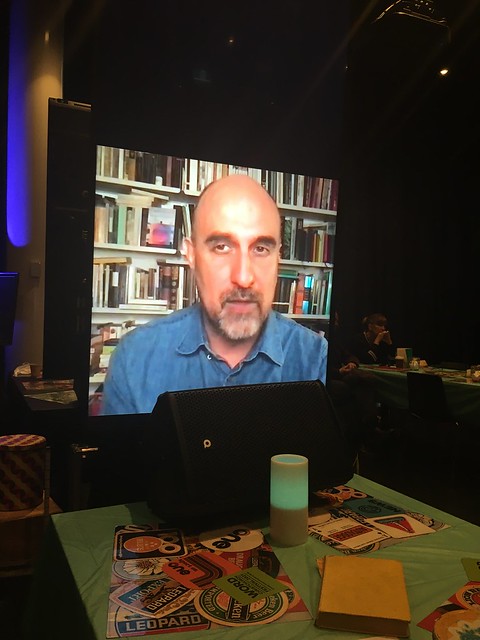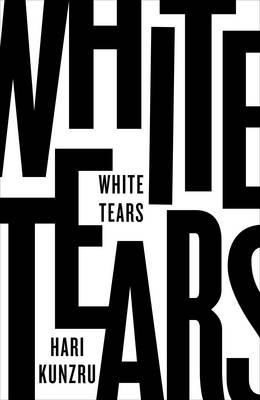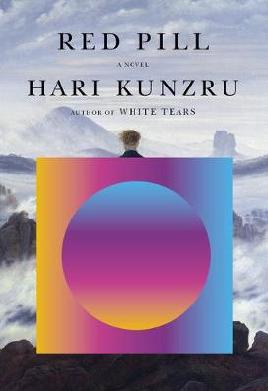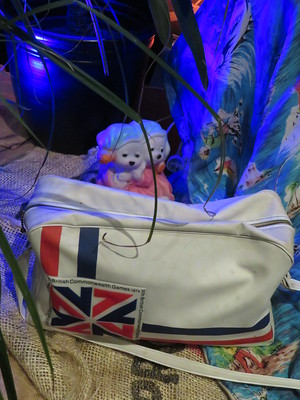I've been inside TSB Space/Tautoru at Tūranga numerous times before, for a range of events. I'm familiar with its dimensions, its outlook onto Cathedral Square, the artwork that runs along its western wall. But when I enter on Saturday afternoon it is transformed to the point where I feel disoriented. The dimensions of the room don't even feel the same. It's like something is off, but in a really good way. This... is WORD Christchurch's the Faraway Near.
The Faraway Near
There's a bar on one side with delicious looking baked goods on it. There's an armchair, lamps and potted plants. There's an assortment of... I don't even know how to describe it. I do a full circuit of the space looking for some overarching theme and all I can really come up with is "retro weirdness". I'm there really early so I get a snack and a drink and try to figure out where I should sit. In the end I let providence decide when I notice a book from the Anne of Green Gables series sitting on one of the tables. This will do.
Hari Kunzru's last novel, Red pill, is a descent into the rabbithole of the Internet, and the playground of the alt-right. In it a writer protagonist whose life isn't dissimilar to Kunzru's has a bit of a crisis and ends up following a trail that leads to a potentially very dangerous alt-right figure which some have compared to former Trump strategist and Breitbart News co-founder, Steve Bannon. The book is set during the lead-up to the 2016 US Presidential election.
Journalist and author Philip Matthews is sitting at the next table from me to my left but also his face appears, larger than life on a large screen at the head of my table as he introduces Hari Kunzru, an odd duality but one which doesn't last, as for the rest of the hour it will be Kunzru's face on the screen. As promised, this isn't like Zoom, it's similar but something else. At one point as I eat my snack, it feels like Hari Kunzru can see me eating my cheese scone. At certain points Kunzru takes a sip of red wine. It's all very convivial.

Qanon, the American import nobody wanted
"Coincidence or Conspiracy?" is the kind of jokey thing that I used to say when events aligned in an unexpected way. But the idea of seeing "conspiracy" where there is none is a good deal less funny than it used to be. Even so, it feels weird that as we're sitting inside listening to someone talk about Qanon, and related conspiracy theories, and just metres away in Cathedral Square there's a protest for "freedom" that comes from the same place. So it's not exactly a surprise when Matthews opens with a statement about how this very American movement seems to have been imported into New Zealand political life.
Kunzru points out that though Trump is no longer the president, these ideas that were so popular amongst his support-base are still out there. And that there's an adaptability to them that makes them easy to transport into other contexts, like Japan, or New Zealand. And there's even a sameness to the look of the people it sweeps up into it. Kunzru has seen video clips of protestors from Wellington, talking about Jacinda Ardern being under house arrest (she's not) and there's a lot of similarity.
Why do people fall down the rabbithole?
Matthews wonders what the appeal is (don't we all?)
Kunzru feels that it's about a desire for simplification. We live in complex times, and times of change. But here's a story that tells you who the bad guys are and says that the good guys are going to come and rise up and solve that: "the dream of a solution is always there". For some people there's also a background of "millenarian thinking". "Millenarianism", which is absolutely a word I had to look up, is the belief in an upcoming future utopian period culminating in the second coming of Christ. The idea of a messiah that will arrive and deliver the world from Evil is part of a lot of evangelical Christian belief. As explanations go, this is certainly as good as any other speculation I've ever read on the topic, and to me, points to the importance of "story" in how we frame and perceive the world.
Kunzru is as surprised as anyone that the Messiah-like figure took the form of Donald Trump a "gangster from New York" (he's not the only one) though he points out that Donald Trump grew up in a certain kind of context where the power of positive thinking is key. That you have to block out the negative, and consequently we saw how Trump was almost "allergic to any criticism or debate".
People want "a kind of affirmation on the imminent coming of the Golden Age" and Covid has produced a sense of anxiety that's fertile ground for ideas like these to take root.
Trump, The Metaverse and Covid
Matthews tells Kunzru that Red Pill "captures the dread of the Trump era" very well. But what are things like now?
Kunzru says that with mid-term elections on the horizon it's like being in the eye of the storm. There's not a sense of that being over now because Trumpish politics have taken hold. He talks of things being "in abeyance" only.
It seems very possible that we're not out of the woods yet.
What's his view on The Metaverse (Facebook founder Mark Zuckerberg's umbrella company/Second Life-esque virtual platform)?
My view is that you must burn it [The Metaverse] with fire.
That's about as unequivocal a response as you could hope to get. Kunzru, who spent time in the 90s as a tech journalist harks back to those days of the Internet and how it was imagined as a place for sharing where people could tinker and build things, which is in direct opposition to the "walled corporate gardens" who want to "monetise our various doings there". Moreover the chance of Zuckerberg/Metaverse doing any of what it's setting out to in an ethical way is "approaching zero".
He likens the Internet to a vast "global sensor" that we could be using to do more socially useful things like to fight climate change or to understand ourselves better in all sorts of ways but we're using it to... target ads.
Matthews alludes to our current Delta outbreak and wonders how things are in the U.S. with regards to Covid. Kunzru says it's very "regionally granular". At one point New York, where he lives, was the global centre of Covid but numbers are now down (later I look this up: New York city had over 1300 new cases that day, but given that their cases peaked at 16,751 at one point this does, indeed, constitute "down"). They are mostly back to normal but with various restrictions, including kids wearing masks at school. Whereas in somewhere like Florida the rules are very different and that wearing a mask into a restaurant, for instance, can provoke a quite aggressive, almost violent reaction. He also points out that there is now lots of Covid in mountain states where it hadn't previously been an issue.
There seems to be a lot of overlap in right wing circles with populist politics and a distrust in medical experts. But distrust doesn't always spring from the same source. His own neighbourhood is much less vaccinated than others in Brooklyn because of the African-American population and the corresponding history of distrust in the medical establishment - things like the Tuskegee Study, and just the general appalling health service available in the U.S. Some people, he says, just can't believe that you can get a vaccine for free because their experience of healthcare is that it's exorbitantly expensive.
Climate change is a soggy business
When Matthews asks Kunzru about his basement I am expecting to hear that he's got a doomsday prepper bunker down there (maybe because the earlier Faraway Near session with Mark O'Connell is in my mind). But no. It's because New York is a very wet city and there have been some extreme storms that have caused basements to flood. Matthew's question is in reference to a "mournful Twitter thread" of Kunzru sifting through his waterlogged archives in his basement.
https://twitter.com/harikunzru/status/1433439104126029824
Kunzru is also mournful of "the lack of political will to do the kind of crash decarbonisation" that is probably required for us to change the trajectory we're on in terms of climate change. He likens it to one of those dreams where you're trying to flee from danger but for some reason your legs won't work and you can't run.
Fiction is complicated (and that's good)
As someone who's written both fiction and non-fiction what does he prefer? One of the strengths of fiction, he feels, is that it can address complicated situations and complexity. It can show you individuals up close but then it can scale out and show you a Napoleonic battle, for instance. So you get to see things on different levels within the same story. It is, he says, "a baggy, mish-mash of a form" and it suits him because he's "a magpie-ish kind of person". You get the sense that he picks up little gems or treasures of things and then looks for ways to use them in a story.
He thinks that fiction has a role to play in making people feel more comfortable with the complexity that the conspiracy theorists he referenced earlier are rejecting. Fiction is, "a useful way of bringing a lot of different explanations together".
Despite working as a journalist earlier in his career he has always also written fiction. It's just that explaining new tech developments to people was something that people were willing to pay him for.
Does he have any early career novels hidden in a drawer somewhere? Yes, he does have a couple but they are "both bad in their own special ways" and in retrospect Kunzru is relieved that they were never published.
Of writing he says:
It's an incremental skill that you learn... and you do tend to get better as you get older.
Matthews points out that he got a very sizeable advance for his debut novel, The Impressionist. This came though, with a sense of pressure that wasn't exactly comfortable for Kunzru:
I didn't want to be the kind of person who lost the publishing company a lot of money.
And people, he says, "get a bit complicated" about people who do well. This prompts a bit of conversation about the "tall poppy syndrome" that Kunzru feels is a very British thing (which New Zealanders have too).
People will smile to your face while attempting to chop you off at the knees.
The benefit of having had a number of novels published now is that you "teach people how to read your work... These are my concerns... This is the territory that you're mapping out."
 Conversation turns to White tears, Kunzru's story of music producers who appropriate a blues song and are subject to a vengeful "haunting". The ideas behind the novel are ones of culture and "authenticity". Kunzru says that "the blues is a cypher for authenticity" and notes the way it's used in advertising and other media, conjuring the image of a blues musician sitting on a wooden porch playing the guitar as something you might see in a beer commercial. In White tears he was "trying to put my finger on the sore spot of race and culture" in a Judah-like way and as an outsider. It's a ghost story because ghost stories happen when "things from the past refuse to be buried", things from the past "that infect the present". It's no coincidence, he says, that so many spooky tales in the U.S. start with "the old Indian burial ground".
Conversation turns to White tears, Kunzru's story of music producers who appropriate a blues song and are subject to a vengeful "haunting". The ideas behind the novel are ones of culture and "authenticity". Kunzru says that "the blues is a cypher for authenticity" and notes the way it's used in advertising and other media, conjuring the image of a blues musician sitting on a wooden porch playing the guitar as something you might see in a beer commercial. In White tears he was "trying to put my finger on the sore spot of race and culture" in a Judah-like way and as an outsider. It's a ghost story because ghost stories happen when "things from the past refuse to be buried", things from the past "that infect the present". It's no coincidence, he says, that so many spooky tales in the U.S. start with "the old Indian burial ground".
If that's not a metaphor for the legacy of colonialism and racism in the U. S. (and other places) then I don't know what is.
Podcasts, Internet culture and the cure for nihilism
Matthews then asks Kunzru about his lockdown podcast project, Into the Zone. Kunzru was reading about some of the advances in genetics in terms of sequencing ancient DNA and the new ability to see into the past of migration and origin myths. It was discovered that the builders of Stonehenge don't have any genetic relationship to modern Britons. This symbol of constancy was built by people who were subsequently displaced. Which circles back around to the idea of authenticity again. So he vox-popped some druids, as you do. Origin stories, he reflects, have the potential to be "weaponised and politicised" and we probably need to "be more flexible about our ideas".
When asked if there'll be more Into the Zone he says that it's a team effort and quite expensive but when it's possible to travel again he hopes to do more. For now he's going back to writing essays and is half-way through a novel that it's too early to talk about but it's "got kind of an anxious tone to it. I'm still working through my stuff. Sorry, everybody". In the meantime there's a book of political essays, from his writing for Harpers, that covers conspiracy and the shift that's happened in U.S. politics.
Conversation turns to the Internet, in particular "the chans" as the breeding ground for "a kind of arms race of terribleness" spread largely by young, disaffected men. These were the kinds of places the Christchurch mosque terrorist was radicalised and Trump, he says, was "a candidate of the chans". There has been such a change in what's considered acceptable in political discourse that Kunzru feels that even the most right wing, libertarian politician from 15 years ago would be shocked.
How does he stay sane when he's researching this stuff? If you were someone whose only window on the world was this one, where the only version of human nature you get is "unremittingly awful" then it's not surprising to see people turning into "incels".
He steps away from it sometimes, "....you need to remind yourself that there are decent people in the world, that beauty exists...hug your child."
If people with an ideology can soften you up to accept that the world is a "war of each against each" and that "the worst thing is the truth" then the gateway to becoming a foot soldier in that culture war is that much closer. These are ideas that come up in Kunzru's novel, Red Pill. But, says, Kunzru:
Asserting your values against that is an important thing to do right now.
Audience questions
It's time for audience questions. These are facilitated by a travelling hand mic and camera operator that means that Kunzru can see who is asking the question. WORD Christchurch co-director, Rachael King, seated at Matthews' table is first cab off the rank asking about the writing residency he took up to write a memoir.
 That memoir, it turns out, morphed into his most recent novel Red Pill. Kunzru thought he'd try his hand at "Autofiction", a form of fictionalised autobiography, but "I realised that I like making stuff up". He liked going off on tangents, so the protagonist is superficially like him but that's where it ends.
That memoir, it turns out, morphed into his most recent novel Red Pill. Kunzru thought he'd try his hand at "Autofiction", a form of fictionalised autobiography, but "I realised that I like making stuff up". He liked going off on tangents, so the protagonist is superficially like him but that's where it ends.
But is the Anton character in Red Pill Steve Bannon? Kunzru says he's younger and more handsome and a composite of some different people he's read about. His character comes from the idea that you get in far-right discussions about how public you can be about your racist views which is known as "hiding your power level". Anton, as the showrunner for a popular TV show has a very high profile but has these extreme views which the protagonist starts to be able to see.
Some asks about the blurring of the alt-right movements which aren't the same as they've been in the past, some like the Proud Boys, are bourgeois or middle class. These are not just people who are out on the fringes. Kunzru points out that in some ways this is not new, referencing the distinction made in Germany between "boot-wearing Nazis" and "tie-wearing Nazis". But it's certainly the case that the alt-right has developed more as a culture with its own jokes and fashion. The discovery of irony has been key, says Kunzru "the culture of irony that surrounds far-right discourse" allows them to say things and then "unsay them" because they were only joking. And this has been important for "mainstreaming" and getting their messaging into broader channels. The "OK" hand sign for instance, allows for totally plausible deniability. Eventually though, the irony falls away and someone who started out as an "edgelord" can grow into a committed rightist.
The culture of the mosque terrorist is full of jokes and in-jokes, but the output is terrifying.
The media, unfortunately doesn't help with this due to the ideas of "objectivity" and "both sides" which are fine if both sides are acting in good faith but ironic edgelords are not doing that. And there may well be layers of reference that the media aren't picking up on.
Another audience question references the overlap between anti-vax and the far-right, as "Rudolf Steiner meets Rudolf Hess". Kunzru calls is "conspirituality" and yes, yoga and wellness can act as "vectors for far-right ideas". Even surfer culture is open to various kinds of "woo" and is therefore vulnerable.
The requirement to trust a technical and scientific kind of knowledge rubs some people up the wrong way.
And so this stuff is percolating through all sorts of subcultures that we wouldn't expect them to.
A follow-up audience question searches for more clarity on what far-right actually means in the way that Kunzru is using it, since yoga and surfers and Rudolf Steiner communities don't seem to have much in common with what we think of as the far-right. Kunzru says that he means it in terms of extreme social control though there's no one definition but it's currently pulling in "lovers of freedom against authority". And it does seem contradictory.
Kunzru struggles to answer this one a bit, I think but admits that "it's a deeply, deeply complicated thing". My take is that it's possible to start off as someone who's into holistic healing or surfing, and maybe it's only a superficial commonality that starts you on the path... it's where you end up that's the scary thing.








Add a comment to: It’s complicated: The Faraway Near with Hari Kunzru